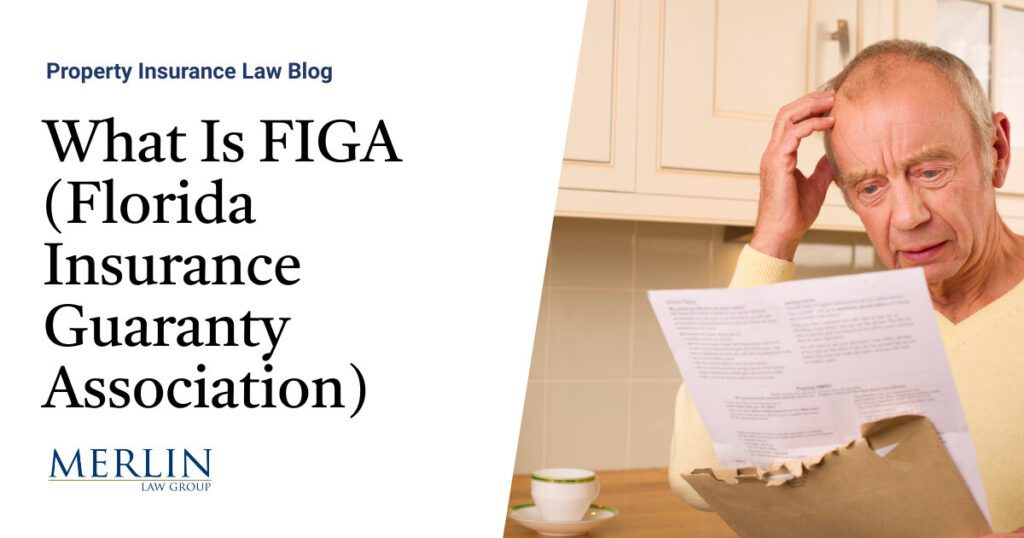What Is FIGA (Florida Insurance Guaranty Association)?

Suppose your insurance company sends you a letter notifying you that it’s liquidating, and you have a pending claim that will now be handled by FIGA (the Florida Insurance Guaranty Association). Where does that leave your claim? What do you do now? This article provides a brief overview of FIGA and what it may mean for your claim.
What Is the Florida Insurance Guaranty Association?
FIGA is a nonprofit association that was established by the State of Florida to protect policyholders when an insurance company becomes insolvent. It’s a statutorily created association whose main responsibility is to protect policyholders from financial loss following the insolvency of an insurance company.
What Happens When FIGA Takes Over?
FIGA steps in and assumes the responsibility of the failed insurer by paying covered claims, policy benefits, and other related expenses for the failed insurance company. It also keeps track of the financial stability of insurers operating in Florida, conducts regular assessments to identify potential financial risks, and takes action to protect policyholders when needed.
What Is the Purpose of an Insurance Guaranty Association?
The main purpose of an insurance guaranty association is to protect policyholders by ensuring the continued availability of insurance coverage and financial assistance in the event that a policyholder’s insurance company becomes insolvent.
What Powers Does FIGA Have?
FIGA’s powers include:
Taking over an insolvent insurer’s policies, and investigating, negotiating, and settling outstanding claims on that insurer;
Determining whether a claim is covered under Florida law and the applicable insurance policy;
Determining benefits for covered claims that haven’t been paid up to certain statutory limits;
Representing the interests of policyholders throughout the liquidation process and advocating for their rights;
Authority to levy assessments on other authorized insurance companies in Florida in order to generate funds necessary to pay covered claims and conduct its operations;
Offering resources and information to help policyholders understand their rights and navigate the claims process should their insurer become insolvent;
The right to reinsure, assume, or cede reinsurance to manage its liabilities and obligations, and the right to pursue subrogation against any party responsible for causing the loss;
The right to bring legal actions or intervene in legal proceedings, including actions against the insolvent insurer or any third party that may be liable for the covered claims;
The right to participate in the liquidation or rehabilitation proceedings of the insolvent insurer and represent the interests of policyholders;
The authority to require authorized insurers to provide information necessary for the administration of its duties and operations and to generate reports and provide information to regulatory authorities.
What Is the Maximum Amount FIGA Will Cover?
The maximum amount FIGA will cover is generally $300,000 per covered claim. An additional $200,000 is available for structures and contents on homeowners’ claims. All FIGA claims are subject to a $100 deductible.
It’s important to keep in mind that the maximum limits are subject to certain exclusions and deductibles under Florida law and the applicable policy. Additionally, claims for non-covered losses or damages would not be eligible for FIGA coverage.
What Do Policyowners Need to Know About FIGA?
In the event that a Florida insurance company goes bankrupt there is a provision in the Florida Statutes that requires an automatic stay for six months to prevent any new or current lawsuits against FIGA from proceeding (see F.S. 631.67). The purpose of the stay is to enable FIGA to obtain necessary claims information and prepare any applicable defenses for those claims. If there’s a pending lawsuit, then nothing can happen in the case for six months. Once the six-month period elapses, FIGA will be substituted as the defendant in place of the insurance company that has become insolvent, and the policyholder can proceed against FIGA. Policyholders should be aware that the six-month stay could be extended if FIGA requests an extension from the court, which is what occurred in 2023 with UPC Insurance.
Policyholders should also know that FIGA covers claims for losses that occur prior to the liquidation of the failed insurer or within 30 days after the order of liquidation unless the homeowner replaces the policy prior to the 30 days expiring. FIGA also refunds unearned premiums.
It’s also important for policyholders to keep in mind that there is a statute of limitations applicable for claims transferred to FIGA. Policyholders need to settle their claim with FIGA or file a lawsuit against FIGA before any applicable deadlines.
Similar to insurance companies, FIGA has its own adjusters who are trained and licensed, and generally are geared towards early recognition and payment of covered claims which must be resolved to avoid financial hardship to the policyholder. Policyholders shouldn’t feel they have to settle their claim for less than what may be owed just because the insurer became insolvent and FIGA has taken over the handling of their claim.
More information about FIGA can be found at FIGA’s website, FIGAFacts.com. The site also offers a way to determine if an insurer is one of its member insurance companies. FIGA membership can be determined by conducting a search here.
Why Merlin?
If you’re a policyholder who has a claim that has recently been taken over by FIGA, don’t hesitate to contact Merlin Law Group. With nearly 40 years of practice and $2 billion in recovered claims, our team stands by your side to ensure you can face any insurance challenge with confidence. Our team can help you understand the process when FIGA takes over and can help resolve your claim. Contact us today for a consultation, or read more about how we’re your trusted advocate.
Further Resources on Insurance Coverage Law
Navigating the complexities of insurance claims can feel overwhelming. Whether you’re facing unpaid claims or simply filing for the first time, our eBooks equip you with the crucial information you need to advocate for yourself with confidence.



